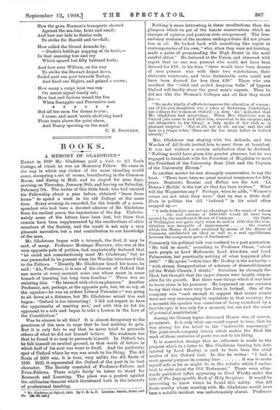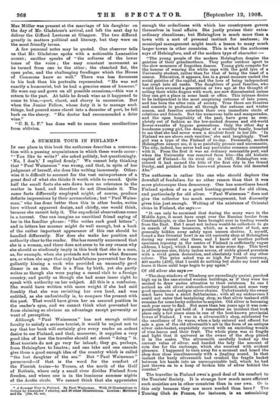BOOKS.
A MEMORY OF GLADSTONE.*
EARLY in 1890 Mr. Gladstone paid a visit to All Souls College, of which he was an Honorary Fellow. He came in the way in which any visitor of the same standing would come, occupying a set of rooms, breakfasting in the Common Room, and dining in Hall, and he stayed for nine days, arriving on Thursday, January 30th, and leaving on Saturday, February 7th. The writer of this little book, who had vacated his Fellowship about a year before, obtained "leave from home" to spend a week in his old College at the same time. Every evening he recorded, for the benefit of a corre- spondent who bad been a devoted admirer of Mr. Gladstone from his earliest years, the impressions of the day. Unfortu- nately some of the letters have been lost, but those that remain have been supplemented by the recollections of other members of the Society, and the result is not only a very pleasant narrative, but a real contribution to our knowledge of the man.
Mr. Gladstone -began with a triumph, the first, it may be said, of many. Professor Montagu Burrows, who was at the very opposite pole of politics, had emphatically declared that "he could not conscientiously meet Mr. Gladstone," but he was persuaded to be present when the Warden introduced him to the Fellows. "Directly Mr. Gladstone heard his name, he said : 'Ab, Professor, it is one of the charms of Oxford that one meets at every moment some one whose name in some branch of learning has long been familiar.' There was no resisting this. "He beamed with obvious pleasure." Another Professor, not, perhaps, at the opposite pole, but, let us say, at the equator—he was an ardent Liberal Unionist—" was going to sit down at a distance, but Mr. Gladstone seized him and began : Oxford is too interesting ! I did not expect to have the opportunity of meeting you,' and with this be led his opponent to a sofa and began to take a Lesson in the Law of the Constitution."
Was he sincere in all this P It is almost derogatory to the greatness of the man to urge that he had nothing to gain. But it is only fair to say that he never tried to persuade others of what he did not himself believe. His weakness was that he found it so easy to persuade himself. In Oxford, too, be felt himself on neutral ground, in that world of letters in which half of his soul was wont to dwell. And the particular spot of Oxford where he was was much to his liking. The All Souls of 1890 was, it is true, very unlike the All Souls of 1830. Still, it represented the Oxford of the past in its best character. The Society consisted of Professor-Fellows and Prize-Fellows. These might fairly be taken to stand for Research and Learning. The place was a protest against the utilitarian theories which threatened both in the interests of professional teaching.
• Mr. Gladstone at Oxford, 1890, By C. B. L. F. London : &WM, Elder, and Co. [51s. 6d. net.]
Nothing is more interesting in these recollections than the glimpses which we get of the innate conservatism which no changes of opinion and position ever overpowered. The free- and-easy costume of the modern undergraduate did not please him at all. He looked back with something like regret to contemporaries of his own, "who, when they were not hunting, made a point of promenading the High Street in the most careful attire." He lectured at the Union, and observed with regret that no one was present who could not have been dressed for £10; in his time "there would have been dozens of men present who with their two watchchains, their elaborate waistcoats, and their fashionable suits could not have been dressed for less than £30." Those who can recollect the "oiled and curled Assyrian bulls" of bygone Oxford will hardly share the great man's regrets. Then he did not like the Women's Colleges and all that they stood for :—
" He spoke kindly of efforts to improve the education of women : one of his own daughters was a tutor at Newnham, Cambridge;
but colleges for women at Oxford !—a deep ' indicated that Mr. Gladstone had misgivings. When Mrs. Gladstone was in Oxford [she came to look after him, somewhat to his surprise, and not altogether to his liking] a lady spoke of her visit as 'a pleasant surprise.' 'Not at all, not at all, ma'am,' said the old man in a tragic voice, there are far too many ladies in Oxford already.'"
Mrs. Gladstone was staying with the Aclands, and the Warden of All Souls invited him to meet them at breakfast. It was not without a certain satisfaction that he declined. "Nothing would have given him greater pleasure, but he was engaged to breakfast with the President of Magdalen to meet the President of the University Boat Club and the Captain of the University Eleven."
In another matter he was strangely conservative, to say the least. "There have been no great musical composers for fifty years. Donizetti, Rossini and Bellini are the last. 'La Donna e Mobile' is the last air that has been written." What will the Wagnerites say ? Perhaps, when he adds, "Women's voices are not what they were," that he was a little deaf. Even in politics the old " bedrock " in his mind often cropped up :—
"A wide franchise was not an advantage to the cause of reform
the real reforms of 1830-1880 would all have been carried by the unreformed House of Commons . . . . . . tho Duke of Wellington was quite right when he said in 1830 that the Con- stitution was incapable of improvement the control which the House of Lords exercised by moans of the House of Commons established an ideal as well as a real equilibrium between the component parts of Parliament."
Commonly his political talk was confined to a past generation. "He told us much," according to Professor Oman, "about such people as Lord Melbourne, Lord Aberdeen, and Lord Palmerston, but practically nothing of what happened after 1886." "He spoke "—this time Mr. Godley is the authority- " with strong disapprobation of schemes of disestablishment (of the Welsh Church, I think)." Socialism he strongly dis- liked, but thought that the upper classes were largely respon- sible for its growth. But there were things which it was best to leave alone in his presence. He happened on one occasion to say that there were very few Jews in Ireland. One of the company was "rash enough to suggest that recent events were not very encouraging to capitalists in that country; for a moment the speaker was conscious of being transfixed by a terrible eye; it was only for a moment, but one had the sense of potential annihilation."
Among the literary topics discussed Homer was, of course, prominent. It is only what one would expect to hear, that he was strong for the belief in the "indivisible supremacy." The joint-stock-company theory which makes the Iliad the work of three centuries of poets was not to his liking.
It is somewhat strange that no reference is made to the purpose which in a letter to Mrs. Gladstone bearing this date (quoted by Lord Morley) is said to have been the chief motive of the Oxford visit. In this he writes : "I had a most special purpose in coming here it was to make myself safe as far as might be in the articles which I under- took to write about the Old Testament." These were after- wards published (after appearing in Good Words) under the title of The Impregnable Rock of Holy Scripture. It would be interesting to know where be found this safety. One All Souls worthy whose meeting with Mr. Gladstone would have been a notable incident was unfortunately absent. Professor Max Muller was present at the marriage of his daughter on the day of Mr. Gladstone's arrival, and left the next day to deliver the Gifford Lectures at Glasgow. The two differed greatly in matters political and literary, but they were on the most friendly terms.
A few personal notes may be quoted. One observer tells us that Mr. Gladstone spoke with a noticeable Lancashire accent ; another speaks of "the softness of the lower tones of the voice ; the easy constant movement as he turned from one to the other ; the clenched fist, the open palm, and the challenging forefinger which the House of Commons knew so well." There was less fierceness in his look than his portraits represented. "He was not exactly a humourist, but he had a genuine sense of humour." He wore cap and gown on all possible occasions,—this was a return to the past. At table he drank wine as it happened to come to him,—port, claret, and sherry in succession. But when the Junior Fellow, whose duty it is to manage such things, had poured some claret into a decanter of port, he fell back on the sherry. "His doctor had recommended a drier wine."
"C. R. L. F." has done well to rescue these recollections from oblivion.











































 Previous page
Previous page